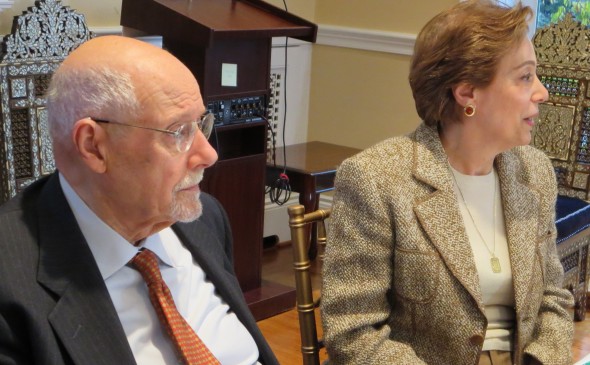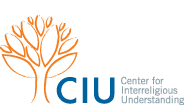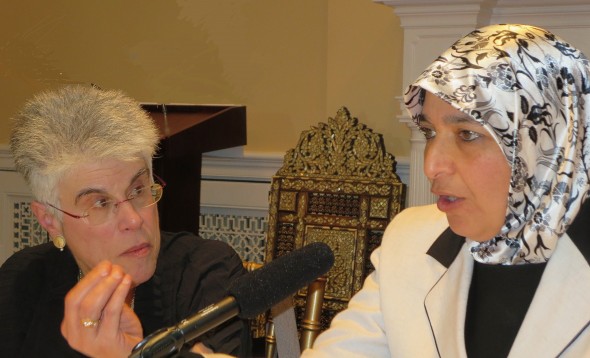CIU & KARAMAH
The Outsider and Stranger
Viewed at Muslim-Jewish Roundtable
With the Muslim community under attack from many quarters, and Muslims being treated as “outsiders,” it was no accident that the concept of “the Other” was the first topic of this winter’s “Muslim-Jewish Roundtable,” hosted in Washington D.C., by Karamah, Muslim Women Lawyers for Human Rights. The second panel centered on family law.
The Roundtable was the continuation of the discussion begun by the Center for Interreligious Understanding in New York last year, “Law and Ethics in Judaism and Islam – a conversation.”

Rabbi Bemporad and Prof. Azizah al-Hibri address the treatment of “Others” at the Muslim-Jewish scholarly forum.
Rabbi Jack Bemporad, CIU director said, “Proper treatment of the stranger is central to the Bible and the experience of slavery, because God says, ‘You know the heart of the stranger because you were strangers in the land of Egypt.’ So we are supposed to ‘Love the stranger because he is equal to you.’ ”
“What we should take from the Bible,” he continued, “is that there is only one law, both for you and for the stranger, so when a stranger sojourns in our land, [we must] treat him the same way that we treat the native born. Unfortunately,” he commented, “today we treat everyone as strangers, because there is no trust.”
Karamah Founder Dr. Azizah Y. al-Hibri started with a different observation and examined today’s Thanksgiving dinner. “Nowadays, we have no strangers at the table at the typical American Thanksgiving; it is families together. At the original Thanksgiving, there were Pilgrims, as well as outsiders, native Americans.”
Dr. al-Hibri said she finds it “Surprising that today we don’t open our homes to the stranger and the other. It is ironic that this country, founded on Christian tradition, closes its home to strangers.”
Both Dr. al-Hibri and Rabbi Bemporad agreed that the concept of one humanity starts with the concept of monotheism. They fleshed out the belief, not only in one God, but also in one people, noting it is rooted in the Biblical concept that all of us descended from Adam and Eve. “If there is more than one god,” Dr.al-Hibri noted, “they will be fighting with one another,” while Rabbi Bemporad added that another problem with many gods is that they don’t act justly.
Discussants in the second half of the panel did not separate Family Law from women’s issues and the status of women, especially Biblically. “God is actually the first feminist in the Bible,” Rabbi Judith Hauptman, Prof. of Talmud at the Jewish Theological Seminary, NY, said. She explained that when the daughters of Zelophehad (Numbers 27:7) ask Moses for their father’s portion in the land of Israel (since he had no sons) God says their request is just and decrees that daughters inherit when there are no sons.
But Rabbi Hauptman explained, “The Talmudic rabbis inherited a [patriarchal] framework of Biblical law; they made changes that improved women’s status…that took women from being chattel to being 2nd class citizens.” Prof. Hauptman asserts that this was a huge leap forward, although she contends, “Women of today bash the Talmudic rabbis for not bringing women up to 20th century standards, but that is not fair.”
Dr. Zainab Alwani, Associate Professor of Islamic Studies, the Howard University School of Divinity, started by saying that the main objective in the Koran is the family – family is the cornerstone of [Muslim] society, while marriage is a mutual agreement and understanding between the husband and wife.
She explained that Muslim women today go back to the Koran and the Sunna to identify what is true Islamic law, in order to discover what has been perverted by custom.
According to Bushra Jabre, Sr. Communication Advisor, Johns Hopkins Center for Communication Programs/Bloomberg School of Public Health, “Because it is a patriarchy, and custom supersedes religion, [Islamic] women are now using the Koran to fight for their rights.” She noted that, “In Islam, women can initiate divorce, although if she doesn’t have a good reason, she has to return her dowry, while if the husband divorces, he has to support wife and children.” She added that women – a wife, daughter or sister, can inherit in Islam.
Although no exact date is set, the CIU and Karamah plan to continue these discussions, which examine issues that impact both religions.

